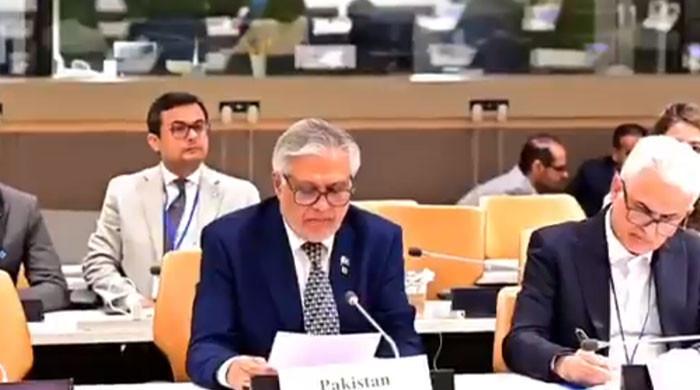- Dar names TTP, BLA, Majeed Brigade as major threats.
- DPM warns groups collaborating with Al-Qaeda.
- Terrorists exploit social media for propaganda: Dar.
NEW YORK: Deputy Prime Minister and Foreign Minister Senator Ishaq Dar on Wednesday called on the Afghan interim government to take concrete and verifiable measures to ensure their soil is not used for terrorism against neighbouring countries, particularly Pakistan.
Addressing the Inaugural Meeting of the OIC Contact Group on Afghanistan, the deputy premier voiced Pakistan’s grave concerns over the presence of more than two dozen terrorist groups operating inside Afghanistan.
He named groups including the Tehreek-e-Taliban Pakistan (TTP), Baloch Liberation Army (BLA), Majeed Brigade, and East Turkestan Islamic Movement (ETIM), highlighting their active collaboration with Al-Qaeda and the serious threat they posed to regional and international peace and security.
The country has witnessed a surge in cross-border terror incidents since Taliban rulers returned to Afghanistan in 2021, particularly in the bordering provinces of KP and Balochistan.
The two nations share a porous border spanning around 2,500 kilometres with several crossing points which hold significance as a key element of regional trade and relations between the people across both sides of the fence.
However, the issue of terrorism remains a key issue for Pakistan, which has urged Afghanistan to prevent its soil from being used by groups such as the TTP to carry out attacks inside the former’s territory.
Islamabad’s reservations have also been confirmed by a report submitted to the United Nations Security Council (UNSC) by the Analytical Support and Sanctions Monitoring Team, which has revealed a nexus between Kabul and the TTP, with the former providing logistical, operational, and financial support to the latter.
“Our law enforcement officials and civilians continue to make enormous sacrifices due to terrorism emanating from Afghanistan. Earlier this month, 12 Pakistani soldiers were martyred while combating TTP infiltrators along our border,” DPM Dar said while addressing the OIC contact group today.
He further warned that terrorist organisations were increasingly exploiting digital platforms and social media for propaganda and incitement to violence. “This cannot be tolerated under any circumstances,” he emphasised.
Dar proposed the establishment of a working group comprising experts from OIC member states to develop a practical roadmap with reciprocal steps to address Afghanistan’s pressing challenges.
He reiterated Pakistan’s commitment to supporting all efforts aimed at achieving a peaceful and prosperous Afghanistan but stressed that this required “mutual respect, sincerity, and the political will of the Taliban authorities to help us help themselves.”
He underlined that no country desired normalcy and stability in Afghanistan more than Pakistan, noting that the destinies of both nations were closely intertwined.
Warning that shifting global priorities risked sidelining Afghanistan, Dar called on the OIC to focus on the country’s multiple crises, including crippling sanctions, terrorism, narcotics, a dysfunctional banking system, unemployment, poverty, human rights concerns, and a political dispensation still unrecognized more than four years after taking power.
The deputy prime minister outlined a six-point approach for the OIC to support Afghanistan: secure adequate humanitarian funding from international donors without political bias; help stabilise the Afghan economy and banking sector to promote trade and connectivity projects; encourage dialogue with the Taliban to ensure compliance with international obligations; support UN-led initiatives to provide alternative livelihoods for ex-poppy farmers; urge the Taliban to lift restrictions on women and girls, which run contrary to Islamic principles; and create conditions for the safe repatriation and reintegration of Afghan refugees.
“As fellow OIC members, regional partners, and neighbors, we must use this platform to help pull Afghanistan out of its isolation,” Dar said, stressing that peace, stability, and prosperity in Afghanistan were essential for the region and the wider Muslim world.


